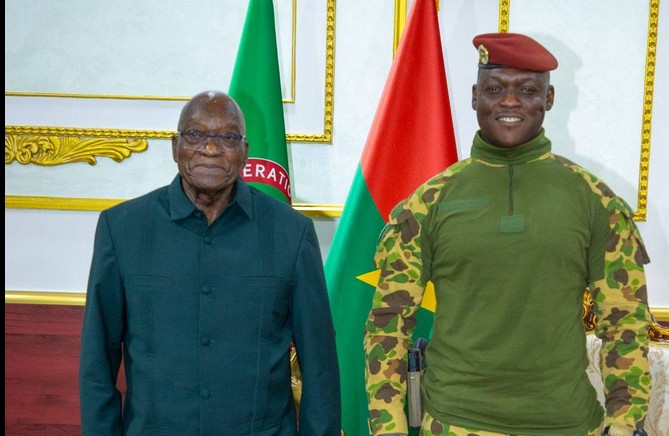- Details
- Headlines
Jacob Zuma hails Burkina Faso as “hope for Africa’s liberation
[OUAGADOUGOU, Nov 3] – Former South African president Jacob Zuma arrived in Ouagadougou for talks with Captain Ibrahim Traoré, a visit that both leaders framed as part of a larger Pan-African awakening. Their meeting at the Koulouba Palace came as Burkina Faso consolidates new alliances built on self-determination, resource control and continental solidarity.

“This is not a coup d’état,” Zuma told reporters. “It is a liberation project for Africa. The colonisers still believe our wealth belongs to them — we must now say enough.”
A shared Pan-African vision
Zuma hailed Traoré’s government as “a model for courage and independence,” linking Burkina Faso’s stand to earlier freedom movements across the continent. For Traoré, the meeting symbolised recognition from southern Africa’s liberation generation and a mandate to advance the unfinished work of economic decolonisation.
Both men agreed that Africa’s next struggle is not political independence but resource sovereignty — ensuring that gold, uranium and energy revenues serve citizens first. Zuma commended Ouagadougou’s decision to build regional defence and development pacts with Niger and Mali, calling the move “an expression of collective responsibility in the Sahel.”
Continental ripples
Diplomatic sources note that Zuma’s visit comes amid a broader shift toward African-centred policy coordination. From Niamey to Johannesburg, leaders are voicing the same frustration: decades after formal independence, Africa still exports raw wealth and imports poverty. Traoré’s administration has become a rallying point for those demanding a clean break from neocolonial structures and aid dependency.
Civil-society figures in Burkina Faso say Zuma’s presence “legitimises the vision that Africans can chart their own future without permission.” Regional commentators argue that the visit also re-energises South-South cooperation and gives moral weight to Traoré’s calls for continental unity.
Looking ahead
Analysts expect further high-level exchanges between Ouagadougou and other states seeking non-aligned partnerships in energy, security and digital innovation. For now, Zuma’s departure message captured the tone of the day: “Africans must stop asking to be free — we must act free.”
- Details
- News Team
- Hits: 186
Local News
- Details
- Society

Kribi II: Man Caught Allegedly Abusing Child
- News Team
- 14.Sep.2025
- Details
- Society

Back to School 2025/2026 – Spotlight on Bamenda & Nkambe
- News Team
- 08.Sep.2025
- Details
- Society

Cameroon 2025: From Kamto to Biya: Longue Longue’s political flip shocks supporters
- News Team
- 08.Sep.2025
- Details
- Society

Meiganga bus crash spotlights Cameroon’s road safety crisis
- News Team
- 05.Sep.2025
EditorialView all
- Details
- Editorial

Robert Bourgi Turns on Paul Biya, Declares Him a Political Corpse
- News Team
- 10.Oct.2025
- Details
- Editorial

Heat in Maroua: What Biya’s Return Really Signals
- News Team
- 08.Oct.2025
- Details
- Editorial

Issa Tchiroma: Charles Mambo’s “Change Candidate” for Cameroon
- News Team
- 11.Sep.2025
- Details
- Editorial





